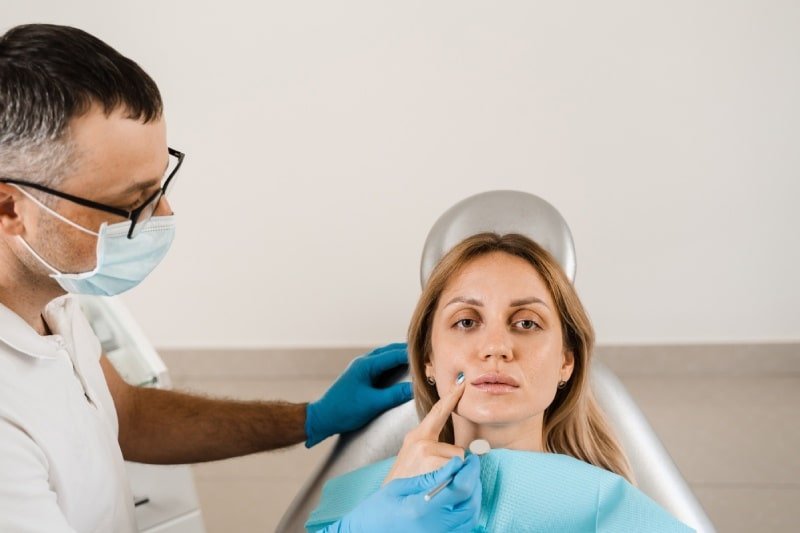Menu
Free Consultation

Jaw fracture, which occurs due to various causes such as a fall, a work accident or a traffic accident, is a problem that needs to be treated urgently and negatively affects a person's life. A jaw fracture with symptoms such as pain, swelling, difficulty chewing, and bleeding in the mouth can cause facial swelling when it occurs in the upper jaw.
A jaw fracture, which can be defined as a fracture of one or more of the bones that make up the jawbone, can also occur without any known cause. A stress fracture caused by grinding teeth for a long time or clenching the jaw is the most common type of spot jaw fracture.
It is possible to treat a jaw fracture with different techniques. Resting the jaw with a strap or wire is often a preferred method to ensure that the jaw area remains motionless during the healing process. After the jawbone treatment is applied, the pain can be reduced and the patient's comfort can be increased with the help of different painkillers.
In case of an infection in a jaw fracture, antibiotic therapy should be started. Surgical intervention may be required, especially if the bones are significantly displaced, an infection occurs, or if the expected recovery cannot be achieved after a few weeks of healing.
The most commonly used treatment for a jaw fracture is to splint the jaw and wait for the jaw to heal by prescribing painkillers. At this stage, if the fracture is displaced, an X-ray can be performed to determine whether there is a fracture in the jaw or whether there is a problem with jaw bone resorption. If there is severe pain on the face or the mouth cannot be opened properly, an orthodontist or oral surgery should be applied without delay.
Before starting treatment for a jaw fracture, the mouth and jaw are examined to determine whether there is a fracture. If there is a fracture in the jaw, it is necessary to decide whether surgery is necessary. At this stage, an X-ray is usually taken to determine whether the jaw fracture needs time to heal on its own. The purpose of jaw fracture treatment is to correct the jaw fracture and keep it in place until it heals. For this, a screw can be inserted into the bone or a screw plate can be used to stabilize the fracture site.

Jaw fracture treatment takes an average of 4 weeks. The healing process may vary depending on the size of the jaw fracture and the damage it causes for each patient. Depending on this, it can last up to 8 weeks.
The first treatment of the patient after the examination begins with anesthesia, so it is possible to prevent the patient from experiencing pain. In cases where the patient's teeth do not meet each other, the necessary treatment is performed. The patient is treated without any pain under the effect of anesthesia. Depending on the condition of the damage caused to the jaw, the bones are replaced first. In case of bone loss, it may be necessary to add metal parts or bone. The jaw is connected through the use of wire.
The symptoms that may be caused by a jaw fracture can be listed as follows:
The recovery time of a jaw fracture may vary depending on the patient's age, general health status, which bone region the fracture is located in, how many fragments the fracture is and similar elements. This period usually ranges from 4 to 8 weeks. Dec. The full recovery process is usually completed within 6 months.
In case of jaw fracture, oral care should be performed in a complete manner and due attention should be paid to oral hygiene. In addition to brushing your teeth regularly, it is also recommended to gargle. In order to prevent a possible infection, all the recommendations of the doctor must be fulfilled completely. In this way, it may be possible to experience a fast and healthy recovery process.
If abnormal swelling occurs in the area where the fracture is located after the first 7 days, it is necessary to consult a doctor. In case of possible bleeding, it is also important to go to the doctor without moving the fracture site. Patients should not move the jaw fracture area during the treatment process, and should also fully comply with all the recommendations of their doctors.
There are many different points that need to be considered in order for the treatment of jaw fracture to be successful and for the process to proceed correctly. In order to experience a fast and healthy recovery process, it is necessary to regularly use antibiotics and pain reliever-derived medications prescribed by the doctor. It is important for patients to follow a nutrition program in which liquid and soft foods are predominant throughout the healing process, and to take care not to chew.
One of the most important issues in the healing process is to ensure the best oral hygiene. It should be cleaned with a soft brush and mouthwash should be used, taking care not to damage the periphery of the applied wires. An ice compress should be made to reduce the swelling within the first 24 hours following the surgical operation. In this context, the ice bag is kept in the area for 10 minutes and pulled for 10 minutes. The swelling should start to go down within the first 4 to 7 days. It is necessary to consult a doctor, as the swelling may start to increase instead of going down, which may be a harbinger of infection.
Maintaining the incision site correctly and regularly is important both to ensure infection control and to prevent scarring. Due to the stitches in the mouth, the inside of the mouth should be lightly brushed and antiseptic mouthwash should be used. The bandage should not be removed until the stitches inside the mouth are removed. After the sutures are removed, the incision area should be cleaned with soapy water or peroxide and topical antibiotics should be applied. Staying away from the sun's rays and using sunscreen creams for the 6-month period following the surgery is extremely important to prevent scarring.
Due to the general anesthesia applied during the operation, it is recommended to avoid tasks that require attention for the first 24 hours. In addition, care should be taken not to use alcohol and cigarettes until the treatment is completed. The wires, which are one of the extremely important elements of the treatment, may loosen over time, and when they become excessively loose, there may be a need for intervention.

Fractures may occur in one or more places of the jawbone as a result of traumatic events such as falls, blows and accidents. Due to a jaw fracture, symptoms such as swelling, pain, bruising, difficulty chewing and speaking may occur.
Prices for jaw fracture treatment may vary depending on many different factors. The first of these factors is the location and type of fracture. It is possible for a jaw fracture to be single-sided or double-sided, simple or complicated. Complicated fractures can cause fragmentation or displacement of bone fragments, which can affect the course of treatment and, accordingly, their price. In addition, the severity of the fracture, the expertise and experience of the doctor performing the treatment, and the pricing policy of the clinic where the treatment is performed can also be listed among the elements that have an impact on the prices of jaw fracture treatment. Dec.
In order to determine the prices of jaw fracture treatment, oral and dental examination of the patient should be performed first. However, jaw fracture surgery prices can be determined after patient-specific treatment planning.
